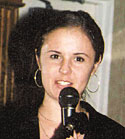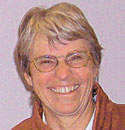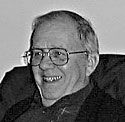|
by Laura Fauth
Susan Knight - Cincinnati, Ohio
Water Sentinel Director, Ohio Chapter
 In her sophomore year at Xavier University in Cincinnati, Susan Knight took a trip to Nicaragua that launched her passion for social justice organizing. In her sophomore year at Xavier University in Cincinnati, Susan Knight took a trip to Nicaragua that launched her passion for social justice organizing.
"I was living with a family in a two-room house and working in the barrio with children in gangs," says Knight. "At that point, I recognized the economic inequities that existed in a very profound way. I realized that the future of Nicaragua was tied to decisions made in the United States, and recognized my responsibility as a U.S. citizen."
Upon returning to the states, Knight delved into social justice issues, from conducting research to protesting to interning on Capitol Hill. After graduating in 1998 with a degree in political science, she spent three years working with the Greater Cincinnati Coalition for the Homeless.
In 2002, Knight, whose mother worked for the EPA under Reagan and Bush Senior, became a Sierra Club Water Sentinel. She works primarily with residents of Middletown, Ohio, to address the health and safety problems created by pollution from the AK Steel plant. (Knight says her mother is supportive of her working for the Sierra Club, "but we don't always see eye-to-eye on policy issues.")
Knight says the most inspiring part of her job is witnessing the courage of Middletown residents. "I speak out and then go home to my quiet apartment in Cincinnati. I don't have neighbors who think I am threatening their jobs," she says. "These people speak out day after day because they believe they shouldn't have to choose between clean air and water and their jobs."
Ellen Pillard - Reno, Nevada
Chair, Toiyabe Chapter
 When longtime Sierra Club member Ellen Pillard decided to become more active in the Club eight years ago, she wasn't sure where she fit in. When longtime Sierra Club member Ellen Pillard decided to become more active in the Club eight years ago, she wasn't sure where she fit in.
A former social worker, Pillard had worked most recently as a professor of social work at the University of Nevada, Reno. Says Pillard, "I thought environmental activism was all about science and organizing, and I didn't have a background in either."
Today, Pillard is chair of the Toiyabe Chapter, and has realized that her background is actually an asset. "I help secure money and do campaign strategy planning," she says. "I also represent the Club in various coalitions. I love to do blue-green coalition work-working with union people on their issues, and getting their support on our issues. I feel quite at home with the human side of the environmental movement."
One of her greatest challenges has been trying to bring people together around polarized issues, such as Walker Lake in western Nevada, which has lost much of its volume due to upstream water diversions. "If we didn't all bring our perceptions of good guys and bad guys to the table, we could come up with a solution that meets everyone's needs," says Pillard. "But it is very difficult to build trust."
Wilderness used to be one of those polarized issues, she says, but thanks to a lot of grassroots organizing, that is beginning to turn around. "In Nevada, I think the solution for environmental health is to work with the people who live on the land," says Pillard. "There isn't enough money in the whole federal budget to put land managers out there. We really need to work with the communities. When I speak to grassroots groups, I say my interest is in community health-and that includes environmental health."
Jim Stephens - Hapeville, Georgia
Secretary, Georgia Chapter
 A youthful 70-year-old, Jim Stephens' passion for the environment keeps him energized-and you can't be around him for long without catching his enthusiasm. A youthful 70-year-old, Jim Stephens' passion for the environment keeps him energized-and you can't be around him for long without catching his enthusiasm.
One manifestation of this enthusiasn is his Six Month Communications Report-a log of the almost daily faxes, e-mails, letters, and calls he makes on behalf of the environment. During the second half of last year alone, he made 82 contacts.
As a child, Stephens developed a love for animals during time spent hunting and fishing in the wild. He studied zoology in college, until school was interrupted by the Korean War.
After retiring in 1987 from a career as an aircraft mechanic, Stephens became a volunteer for Zoo Atlanta, where he served for 15 years.
In addition to serving as Georgia Chapter secretary, Stephens is the Endangered Species Issue Leader for the Georgia Chapter and serves on the Wildlands and Wildlife Committee.
Stephens also brings his environmental work to the faith community. Each month, he produces a newsletter called "Creation and Conservation," which is inserted in his church's bulletin.
Stephens adds humans to the ever-growing list of endangered species. "That's part of my theological-environmental perspective," he says. "I want to help my fellow man. But if the environment goes to hell, he and I both go with it."
To Stephens, helping the environment and humankind is more than an avocation-it's his responsibility.
by Todd Daniel
Know someone whose story is deserving? Contact us at The Planet, 85 Second St., Second Floor, San Francisco, CA 94105; planet@sierraclub.org.
Up to Top
|